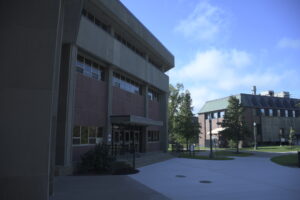 Mt. A’s R. P. Bell Library is on the edge of an exciting transformation. Following a thorough analysis of a comprehensive feedback survey, the Hub for Innovation and Learning Steering Committee is ready to unveil the results. These recommendations will reshape the library into a modern, accessible, and inclusive space that caters to the diverse needs of the Mt. A community.
Mt. A’s R. P. Bell Library is on the edge of an exciting transformation. Following a thorough analysis of a comprehensive feedback survey, the Hub for Innovation and Learning Steering Committee is ready to unveil the results. These recommendations will reshape the library into a modern, accessible, and inclusive space that caters to the diverse needs of the Mt. A community.
The survey, conducted in the spring of 2023, invited members of the Mt. A community to provide valuable input into the library’s future. The responses included 107 students, 17 staff, 27 faculty, and seven administrators. This diverse sample ensured that a wide range of perspectives were considered, aligning the renovation plans with the vision and needs of the community.
Three primary themes emerged from the survey, guiding the library’s future updates:
- Accessibility and welcoming atmosphere:; The library will be a space that is accessible and inviting to all members of the community, including spaces that are sensory-friendly for individuals with sensory sensitivities.
- Preserving the “library feel”:; Despite technological advancements, the essence of a traditional library will be maintained by preserving hardcopy literature while also embracing modernity.
- Diverse and well-defined spaces:; The library will offer a diverse range of spaces that cater to various needs and preferences, ranging from collaborative innovation zones to peaceful areas for quiet study and research.
To translate these themes into actions, the committee focused on several key areas.
The first is a design with purpose. The library’s design will reflect its purpose by offering a diverse range of spaces that are clearly defined. Some areas may be intentionally modern and innovative, while others may lean towards tradition. The collaboration and engagement spaces will be distinct from quiet areas. Differentiating casual and structured spaces through furniture and design elements is a must. Offering a variety of intentionally designed options, such as silent spaces, areas for group work, and spaces for individual study, ensures inclusivity.
The next is to prioritize quiet study spaces. Adequate space for quiet, distraction-free study will be a primary consideration. A variety of seating options, seclusion options, and activity levels will be integrated with visible book stacks considered to promote a studious atmosphere.
The final area of focus is sensory-friendly spaces. A significant recommendation is the creation of sensory-friendly rooms for neurodivergent individuals and those with sensory sensitivities. These spaces will provide a comfortable environment free from sensory distractions.
Additionally, the importance of better coffee and more snack choices was not lost on the committee, demonstrating their commitment to updating the library’s dining options.
Dr. Rachel Rubin, the Dean of Libraries and Archives as well as the Acting Dean of Arts, expressed her gratitude for the active participation of the Mt. A in the feedback survey. She stated, “We are grateful to those of you who participated, and we are pleased to share what we’ve learned with you,” underlining the importance of community engagement in shaping the library’s future.
Dr. Rubin also encouraged community members to stay informed by following the library’s Instagram account (@mta_libraries), where they began sharing some of their findings. This social media presence is not only to keep the community engaged but also allows for a more transparent and inclusive approach to the renovation process.
The Mt. A community’s feedback aligns with findings from academic library space studies, reinforcing the importance of a variety of spaces with defined noise levels, such as traditional quiet areas, group spaces, and multimedia labs. The ability to accommodate both collaborative and individual study spaces is crucial and will be achieved through careful planning of design elements.
The Mt. A University R.P. Bell Library renovations are set to create a dynamic and inclusive space that meets the diverse needs of its community. By prioritizing accessibility, preserving the library’s essence, and providing a range of well-defined spaces, the library’s transformation will empower students, faculty, and staff to thrive in an environment of innovation and learning. The library’s future, shaped by the input and vision of community members, is bright.





